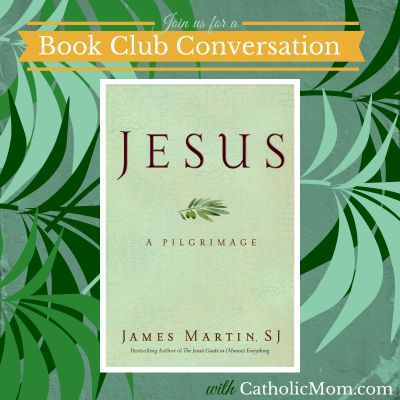Welcome to our virtual book club! We're reading Fr. James Martin’s bestseller, Jesus: A Pilgrimage. Each week we will tackle a chapter and look forward to a lively discussion together.

When I was reading about the Jordan River being bright green, I'll admit: it wasn't the biggest selling point for me. And then, in lieu of reflecting on it in more depth and actually writing this post ahead of time, I found myself sick in bed, with dashes to the bathroom thrown in for good measure.
I forgot all about this post, as a matter of fact, until I stumbled out of bed this morning and realized (a) there would be no coffee for me just yet and (b) I hadn't written my post.
Isn't that just the way things are? Life is full of an element of the unexpected, and the control freaks among us find it disconcerting. The organized among us find it unnerving. The adventurous among us find it alluring.
What can we learn from Jesus' baptism in the not-yet-bright-green Jordan River? I was particularly struck by this passage:
Jesus somehow came to realize that baptism was what God the Father desired for him—to fulfill "all righteousness." Perhaps this meant publicly aligning himself with John's ministry. Perhaps before he began his own ministry, he wanted, in a sense, to pay tribute to that of his cousin, as a way of underlining his solidarity with the Baptist's message. Jesus may also have wanted to perform a public ritual to inaugurate his own ministry.
But there is another possibility, which is that Jesus decided to enter even more deeply into the human condition. Thou sinless, Jesus participates in the ritual that others are performing as well. He participates in this movement of repentance and conversion not because he needs it, but because it aligns him with those around him, with those anticipating the reign of God, with the community of believers. It's an act of solidarity, a human act from the Son of God, who casts his lot with the people of the time. It has less to do with his original sin, which he does not carry, than identifying with those who carry that sin. [...] The divine one is fully immersing himself, literally in this case, in our humanity.
I need that reminder of Jesus' humanity. It helps me relate to him, yes, but it also helps me to take him seriously. Somehow, I tend to think that because he was God, things were not as rough for him. I tend to discount his actions in ways that apply more to me than to him. We have no evidence that he wasn't completely sincere, that he didn't completely love us. I have plenty of evidence of those things for myself, though.
At the Baptism, Jesus was taking sides with us. God stood in line.
Theologians often speak of Jesus as "taking on" the sins of humanity. In his book on baptism, Everything is Sacred, Thomas J. Scirghi, a Jesuit theologian, compares Jesus's sense of sin to the shame that parents might feel if their child were guilty of criminal behavior. There is no sin on the parents' part, but they often feel the weight of the suffering that was caused by their child. As the Protestant theologian Karl Barth wrote, perhaps no one was in greater need of baptism than Jesus, because of this "bearing" of our sins.
This insight really changed my reflections on the Baptism. I guess before it was just a thing Jesus did, and I didn't fully consider or understand the weight of it. Suddenly, reading this, I found myself with a glimpse that changed my mind, that made me better relate with Jesus and appreciate the step he took to the Baptism.
As Thomas Scirghi notes, the sacrament of baptism reorients us. For the disciples of John it marked their willingness to be converted, to experience metanoia, a Greek word meaning a change of perception, a change of heart. Water symbolized both life and death. So baptism was seen as a dying to an old life and being born into a new one. For the early Christians too, it would have marked a radical change and, more than we might be able to grasp today, a new way of life.
For many, baptized as infants, this can be inaccessible, I think. I was baptized as an adult, and this struck me, because I did embark on a new way of life after my baptism. I was struck, too, by Martin's comment a few paragraphs later: "Sometimes we close the door to our past, thinking that since we have "progressed," the past has little to offer. But we need to keep the door to our past open." He continues,
All of our lives are important, even the parts of our past that we have ignored, downplayed, or forgotten. If we open the door to our past, we will discover God there, accompanying us in both happy and sad moments.
Jesus of Nazareth is not simply the man who preaches and performs miracles. Jesus is not a person who, after his baptism, forgets his old life to start anew. Like all of us, he is more than that. He is the boy who played with his friends in Nazareth, and maybe even made human pyramids with them, laughing all the while. He is the adolescent who asked questions and wondered where his life would lead. He is the adult who worked as a tektōn for many years in his hometown.
He wasn't a regular guy, not by any means. And yet...and yet, he relates with us in a way that I can only think of as intimate and real.
To Ponder, Reflect, and Discuss:
- How do you relate to Jesus? How did the reflections in this chapter affect and possibly change that?
- How does a deeper understanding of Baptism help you to better relate to Jesus? Do you find lessons in your own Baptism that you didn't see before?
- What part or parts of your past do you need to open the door to, to see God at work in them and through them?
Feel free to comment on your own thoughts from this week's reading, your impressions and reflections, and/or your answers to these questions.
Next week, we'll cover Chapter 6: Rejection. For the complete reading schedule and information about our Book Club, visit the Jesus Book Club page.
Copyright 2014 Sarah Reinhard
About the Author

Sarah Reinhard
When she’s not chasing kids, chugging coffee, or juggling work, Sarah Reinhard’s usually trying to stay up read just one … more … chapter. She writes and works in the midst of rural farm life with little ones underfoot. She is part of the team for the award-winning Catholic Mom’s Prayer Companion, as well as the author of a number of books.


.png?width=1806&height=731&name=CatholicMom_hcfm_logo1_pos_871c_2728c%20(002).png)
Comments